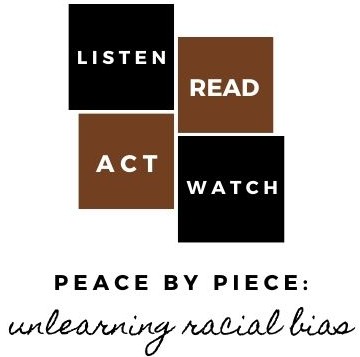This post is part of a year-long series. If my work is helpful for you, consider a contribution through Venmo to support this crucial work of unlearning racial bias.
The question I left you with at the end of the last post was to consider who you are centering as you enter into this soul-searching work of unlearning, relearning, and hopefully gradually dismantling generations-old systems of injustice. So I will share with you who I am centering: my sons.
I have not had what many black parents refer to as “the talk” with my children. From the time they were young, I have of course warned them to keep their hands out of their pockets in the store. And we don’t generally shy away from discussing a kid-version of current events with them. They listen to news podcasts with us, and we answer questions if they ask us.
But.
I consider my sons to be my center for the purpose of this question, because I want to take an active role in helping people other than my circle of friends to open their eyes to the trickle-down manifestations of inequity in this country. I want them to see me doing this work, to know it is for them, and to be conscious that the disparities built into this country’s systems to ensure they don’t have the same access to “the American dream” as their white friends, will slowly and surely be dismantled. I want them to know why the systems exist, and I want them to see their mother working to tear them down.
I also want my sons, and every other black child and adult in this country, to have the opportunity to live full lives, to ripe old ages. This – they, their present, and their future – are my center.
I first heard the song “Hell You Talmbout” several years ago, a short month after Sandra Bland was found hanged in her jail cell three days after police stopped her while she was driving. Sandra Bland’s death had shaken me deeply; she very much reminded me of a cousin who is as close to me as a sister. So when Janelle Monae released this cover as a protest song the following month, I sat myself down at my dining room table while my children napped, and I wept.
Then I played the song again and kept weeping. I repeated the song until I ran out of tears. And then I called my Mama.
The thing about trauma is that it lives in the body. Often, we want to hasten our feelings away. To push our shock and rage into our fingertips and get to work. We want to hurry our bodies through pain and sorrow that we naturally feel in response to trauma – even if we didn’t suffer that trauma ourselves – so that we can mark the issue as resolved and continue on our journey forward.
But our bodies don’t work like that. Feelings don’t work like that. And restorative work – the work of deconstructing hundreds-year-old systems built to ensure that people who have one skin color thrive while everyone else has to fend for themselves – won’t work like that.
So while it is necessary and natural to support protesters, to write your elected officials, and to choose books and movies to share with your kids that help break current events down to their level, our bodies also need us to sit still. A favorite writer of mine says that feelings are for feeling. In other words, the only way out of our feelings is through them. No shortcuts or workarounds will make this inner soul-work faster or more productive; this is a long-term process.
The resource I want to share this week is a playlist of songs that express lament, determination, and comfort. Although it is a YouTube playlist, I recommend listening instead of watching so as not to focus on the images rather than the words from each piece. Pop your earbuds in, close your eyes, and just listen and feel your feelings. Feel the pain of years of your own ignorance and complicity. Feel the grief of black mothers and fathers across the country who have had to bury their babies as a result of brutality. Feel the determination to fight to validate oneself even if no one else will. Feel the insistence on being seen. Feel the comfort and reaffirmation of your own humanity.
When you have done this and are ready to reflect, ask yourself how many names that were chanted in “Hell You Talmbout” were utterly unfamiliar to you. Why did the murders of George Floyd, Breonna Taylor, Ahmaud Arbery break your heart and unsettle your spirit, when the murders of Trayvon Martin, Tamir Rice, and Rekia Boyd didn’t? Why are you ready for this conversation now but you weren’t then?
Bring your answers and a full, open heart back here next week. And we will keep working together toward peace, one piece at a time.


So very well spoken. The clarity of it all!!! Outstanding Querida.